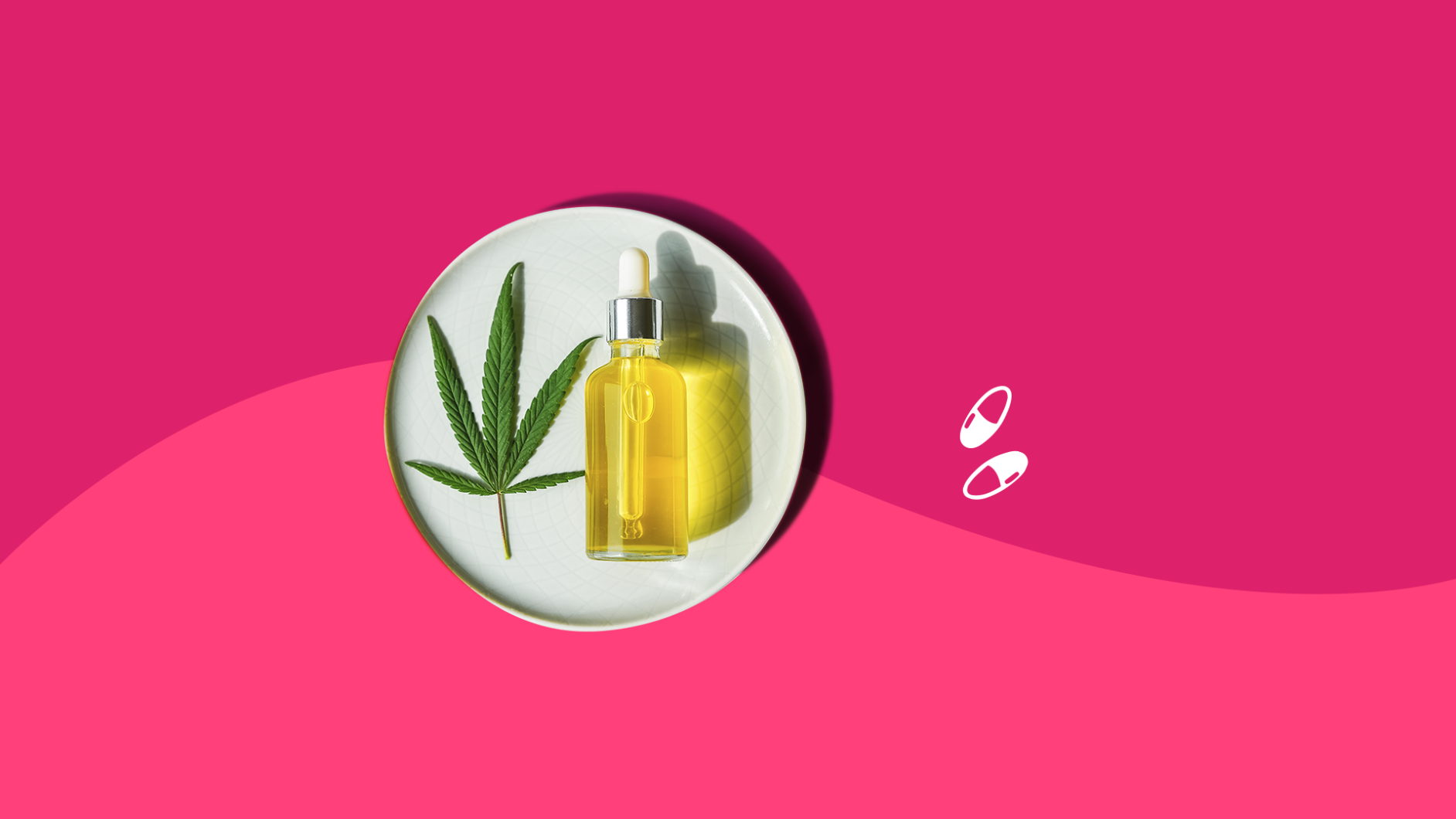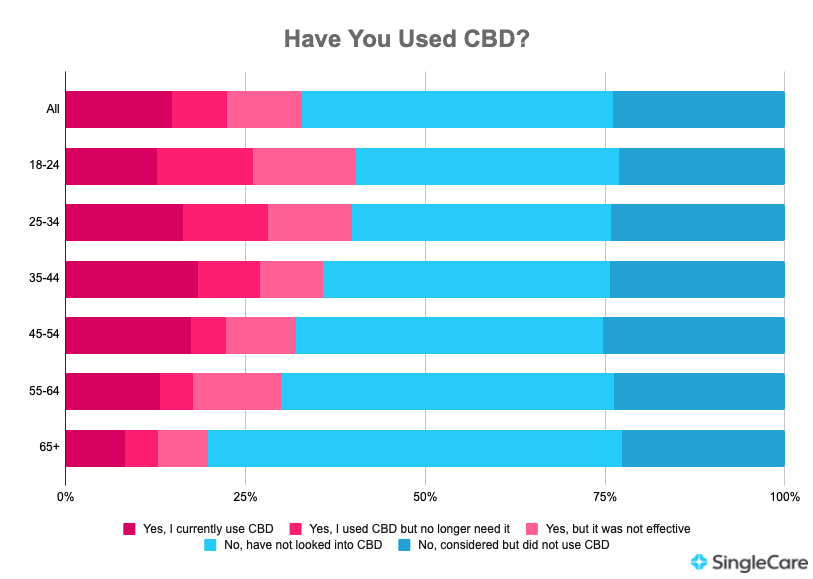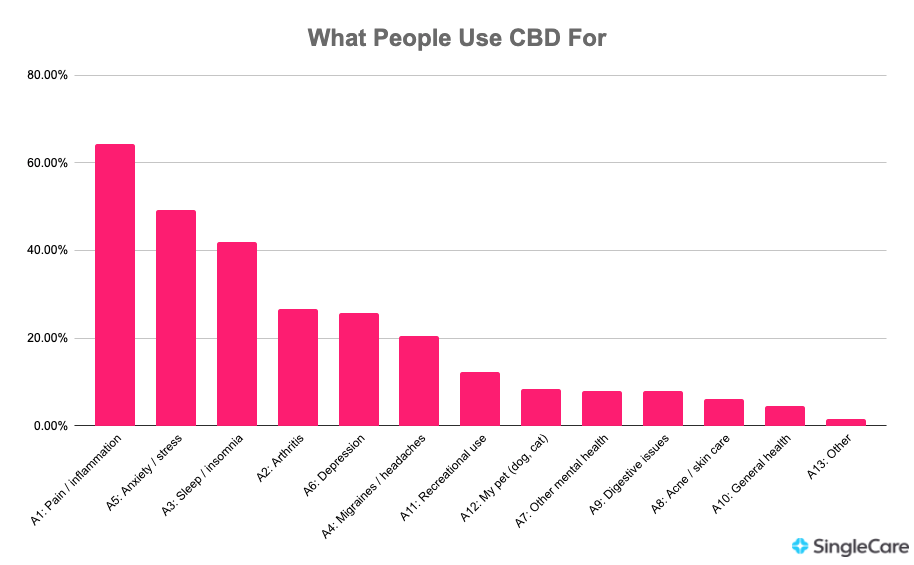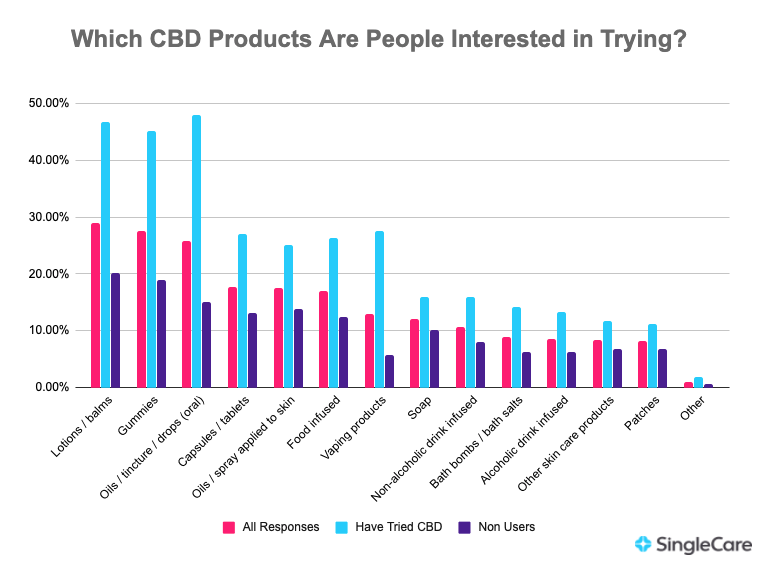Key takeaways
CBD is gaining popularity in the United States, with 33% of Americans having used it, primarily for pain relief and inflammation.
Misconceptions about CBD abound, including confusion with marijuana and unfounded fears of it showing up on drug tests.
The legal landscape for CBD is complex, with hemp-derived CBD products containing 0.3% THC or less being federally legal, but marijuana-derived CBD remaining illegal under federal law.
The effectiveness and use of CBD vary widely among individuals, with 32% of users finding it ineffective, and many using it alongside or in place of traditional prescriptions.
Cannabidiol (CBD) is one of the hottest and fastest-growing alternative health trends in the United States. It’s in everything these days. Go to any health food or vitamin store and you might find CBD oil, gummies, baked goods, soaps, teas—the list goes on. Even though it’s quickly becoming ubiquitous, controversy and confusion still shroud CBD. From local pharmacies to the senate floor, people are debating the merits and drawbacks of these intriguing new products.
With all this information (and misinformation) it’s hard to get a general consensus on CBD therapy. Ask 20 people on the street what they think of CBD, and you’ll likely get responses that range from “it changed my life” to “you couldn’t pay me to try it” or “what’s CBD?” But ask 2,000 people and you’ll paint a pretty vivid picture of CBD use in America, which is exactly what SingleCare did in its CBD survey.
Summary of CBD survey results:
- 33% of Americans have used CBD
- 47% of Americans think the government regulates CBD
- 32% of people who’ve used CBD have not found it effective
- 64% of current CBD users use CBD for pain relief and inflammation
- 36% of people use CBD in addition to a prescription
- 45% of current CBD users have increased their use of CBD since the global coronavirus pandemic
- 26% of current CBD users are stocking up on CBD products due to potential shortages from COVID-19
- CBD based products with the most interest include lotions/balms, gummies, oils (oral drops and topical sprays), and capsules/tablets
- The largest deterrents preventing people from trying CBD include lack of trust in the manufacturers and lack of belief in the benefits
What is CBD?
There are plenty of misconceptions about what, exactly, CBD is. CBD is short for cannabidiol, a naturally-occurring compound found in the cannabis plant. Contrary to what some might think (including 26% of survey respondents), CBD is not the same as marijuana.
Hemp and marijuana are from the same family but aren’t the same plant. Both contain the cannabis compounds CBD and THC, however, hemp has higher CBD and lower THC than marijuana. CBD is non-psychoactive while THC produces psychoactive effects. In other words, CBD won’t get you high like marijuana will because it does not contain THC. Additionally, CBD shows no potential for abuse or dependence, according to the World Health Organization (WHO).
Is CBD legal?
Yes, but only in certain cases. The Agriculture Improvement Act of 2018 legalized CBD products derived from hemp from a licensed grower that has 0.3% or less THC. CBD products derived from marijuana are not legal under federal law—even though several states have legalized and decriminalized marijuana.
The Food and Drug Administration (FDA) has approved only one CBD medication for medical use, Epidiolex, which is a “drug substance CBD for the treatment of seizures associated with Lennox-Gastaut syndrome or Dravet syndrome in patients 2 years of age and older.”
Many Americans have misconceptions about CBD
CBD’s affiliation with marijuana has led to numerous misconceptions about CBD products. For example:
- 26% of Americans think that CBD is the same as marijuana. CBD products are derived from hemp. While it’s in the same family as marijuana, it’s not the same thing and it won’t get the user high.
- 57% of Americans believe that CBD will show up on a drug test. This, too, is untrue… mostly. Products that are pure CBD and are labeled 0% THC should not show up on a standard drug test. However, due to lack of regulation of these products, it’s possible the product could contain trace amounts of THC, despite the 0% label. Products that contain 0.3% are unlikely, but possible, to show up on a drug test.
- 47% of Americans think the government regulates CBD. Currently, CBD isn’t federally regulated, as it’s a supplement and not a medication. But that could change soon as laws around hemp and marijuana are rapidly evolving.
RELATED: Medications that can cause false positive drug tests
33% of Americans have used CBD products
Who uses CBD products? More Americans than you might think. A 2019 Gallup poll found that 14% of Americans use CBD, while one-third of our respondents said they currently use or have used CBD products.
Younger crowds appear more open to CBD use—it’s most common in the 18 to 24 and 25 to 34 age groups. Surprisingly, among the people who have used CBD products, 35- to 44-year-olds are the group most likely to continue using them, while younger people often use them for a short period of time, then stop. These numbers taper off in older populations. 70% of respondents aged 55 to 64, and 80% of respondents aged 65 and older said that they have never used a CBD product.
Why don’t people try CBD?
- 22% don’t trust the product or manufacturer
- 22% believe it won’t help them
- 8% worry it will make them high
Even so, with their growing popularity and accessibility, Americans of all ages are beginning to test out CBD products for a variety of medical conditions.
Americans use CBD for a wide variety of conditions
A quick Google search for CBD will hit you with a wave of websites touting various uses, health benefits, and cures. Compared to long-standing medications and pharmaceutical mainstays, there are very few studies on CBD’s potential uses and effects. While it has shown some initial promise treating a variety of ailments, it’s still new and clinically unproven.
But that hasn’t stopped people from using it for a whole gamut of medical conditions, most often pain and inflammation. More than 60% of people who use CBD (across all age groups) do so for pain management. People also commonly use it for anxiety and as a sleep aid. Although this also depends on the age group. For example, people 65 and older use CBD primarily for chronic pain and arthritis, rarely for anxiety, depression, or recreation. Eighteen to 24-year-olds use CBD instead for anxiety relief or recreational purposes.
- 64% of CBD users take CBD for pain
- 49% of CBD users take CBD for anxiety and stress
- 42% of CBD users take CBD for sleep and insomnia
- 27% of CBD users take CBD for arthritis
- 26% of CBD users take CBD for depression
- 21% of CBD users take CBD for migraines and headaches
- 12% of CBD users take CBD for recreational use
- 8% of CBD users give CBD to their pets
- 8% of CBD users take CBD for other mental health conditions (i.e., PTSD, ADHD)
- 8% of CBD users take CBD for digestive issues
- 6% of CBD users take CBD for acne or skin care
- 5% of CBD users take CBD for general health benefits
- 2% of CBD users take CBD for other reasons
CBD results vary from person to person
There are a ton of variables in play here. You’ve got a diverse array of products, hemp strains, administration routes, doses, and conditions. As a result, people have a wide range of experiences with CBD products.
Out of our respondents, 32% of people who have used CBD found it ineffective. A 68% success rate isn’t bad, but researchers are hoping to improve it by finding more consistent treatment types. Industry pioneers like Tony Spencer, founder of Spruce CBD, are currently seeking answers.
“Further research was conducted and found effective results came from getting a sufficiently high dose, use of a superior method of intake such as tincture under the tongue, and avoiding isolate,” says Spencer. “However, the single biggest factor for getting significant positive results came from using a quality strain of hemp.”
As experts continue gaining knowledge through studies and clinical trials, we might see more standardized and predictable products hit the CBD market.
Americans are open to trying various CBD products
You can put CBD in just about anything. If you like coffee, how about a CBD latte? Or, take a relaxing bubble bath to the next level with a CBD bath bomb. There are products for nearly every part of your life. That said, some of the most popular CBD products are more typical medical administration routes like topical lotions or balms and oral tablets.
Nearly 50% of people who have used CBD prefer oils/tinctures, lotions/balms, and gummies. And those who haven’t tried it are more open to these products as well.
- 29% of people are interested in CBD lotions and balms
- 28% of people are interested in CBD gummies
- 26% of people are interested in CBD oils/tinctures/drops (oral)
- 18% of people are interested in CBD capsules/tablets
- 18% of people are interested in CBD oil sprays (topical)
- 17% of people are interested in CBD-infused food (e.g., CBD chocolate)
- 13% of people are interested in CBD vaping products
- 12% of people are interested in CBD soap
- 11% of people are interested in CBD-infused drinks (nonalcoholic)
- 9% of people are interested in CBD bath bombs and bath salts
- 9% of people are interested in CBD-infused alcoholic drinks
- 8% of people are interested in CBD skincare products
- 8% of people are interested in CBD patches
- 1% of people are interested in other CBD products
CBD is becoming a popular supplement to medications
People have been supplementing prescriptions with natural remedies for years now. CBD is no different.
- 36% of people use CBD in addition to a prescription
- 32% of people use CBD in addition to other natural remedies
- 19% of people use CBD instead of other natural remedies
CBD can have interactions with other drugs, especially Clobazam and Valproate, so anyone considering CBD products should speak with a doctor before proceeding.
RELATED: CBD drug interactions
Americans are upping their CBD use due to COVID-19
Stay-at-home orders and potential long-term effects of the coronavirus pandemic have people looking to stockpile medications, and CBD is no exception. In fact, 26% of current CBD users were stocking up on products in anticipation of shortages due to the coronavirus outbreak. CBD sales spiked 230% prior to shelter-in-place orders, according to Market Watch.
On top of that, around 45% of respondents who use CBD have increased their usage to treat virus symptoms, alleviate stress stemming from the outbreak, or help them sleep.
What does all of this mean?
It’s shown some initial promise, but the CBD industry is still new. As research continues and products evolve, we’ll know a lot more about its uses and potential side effects. A majority of Americans are seemingly satisfied with the positive effects of CBD and looking forward to future developments. There’s a lot we’re still learning, but one thing seems likely—CBD is here to stay.
Our methodology
SingleCare conducted this CBD survey online through AYTM on April 13, 2020. This survey includes 2,000 U.S. residents adults ages 18+. Age and gender were census-balanced to match the population of the United States.







